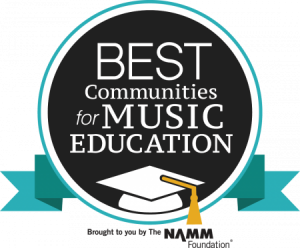The Minisink Valley School District has again been honored with the “Best Communities for Music Education” designation from The National Association of Music Merchants (NAMM) Foundation.
This is the second consecutive year the district’s Music Department has been recognized with this national distinction.
Minisink Valley is one of 975 school districts designated as being among the Best Communities in the nation for music education. The award program recognizes and celebrates outstanding efforts by teachers, administrators, parents, students and community leaders who have made music education part of a well-rounded education. Designations are made to districts and schools that demonstrate an exceptionally high commitment and access to music education.
“Music education is vital to the education of the whole child which is a core component of the mission here at Minisink Valley,” said Joseph Horner, the district’s music coordinator. “This award serves to reinforce the importance of music education as a part of our schools and the entire Minisink Valley community.”
 Superintendent Brian Monahan equally stressed how important music education is to academic achievement and success.
Superintendent Brian Monahan equally stressed how important music education is to academic achievement and success.
“The district is proud to offer a variety of music courses for its students including, general music, band, chorus, music theory, jazz labs, and composition,” he said. “We also offer many extracurricular activities such as drama productions, marching band, jazz ensembles, participation in All-County, Regional and State ensembles. Our Music Department faculty prides itself in teaching a variety of musical styles representative of many different cultures and backgrounds and strives to create an inclusive environment for all students who wish to learn music. They’re the best you will find. Congratulations to our dedicated students, teachers, administrators and community members for earning this recognition.”
Research into music education continues to demonstrate educational/cognitive and social skill benefits for children who make music. In addition, everyday listening skills are stronger in musically trained children than those without music training. Significantly, listening skills are closely tied to perceiving speech in a noisy background, paying attention, and keeping sounds in memory. Later in life, individuals who took music lessons as children show stronger neural processing of sounds. Social benefits include resolution, teamwork, skills, and giving and receiving constructive criticism.
Now in its 25th year, the “Best Communities for Music Education” designation is awarded to school districts that demonstrate outstanding achievement in efforts to provide music access and education to all students.

